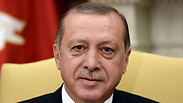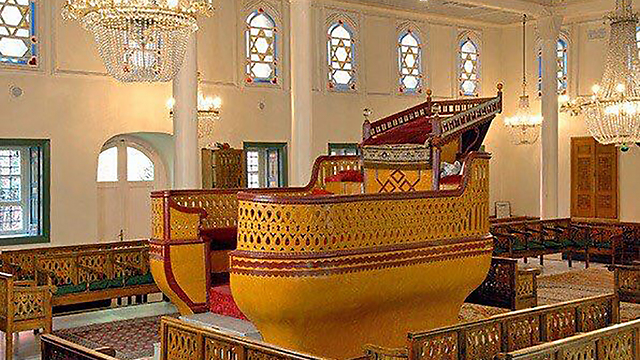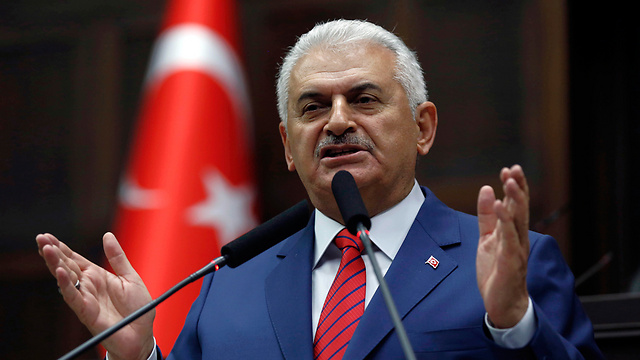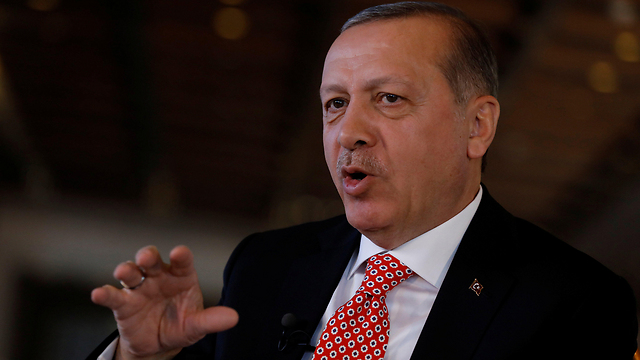
Recep Tayyip Erdogan
Photo: AFP
Two threatening demonstrations and mounting cases of vandalism against synagogues in Turkey—apparently carried out with the regime's tacit support against the backdrop of the Temple Mount crisis—are raising concerns among the country's Jewish community.
On the night between Thursday and Friday, dozens of demonstrators attacked the Neve Shalom synagogue in Istanbul, threw rocks at the synagogue, kicked its doors and tried to break in.
Attacks in Turkey
At the entrance to the synagogue, a local leader of the Great Union Party, Korsat Michan, spoke out and accused Israel of "harassing our Palestinian brothers and damaging their freedom of worship."
"Either the Zionists get a grip, or we will come back here again," he said.
Some protesters shouted, "If you do not let us enter our holy place, we will not let you enter your holy place."
As protesters kicked the doors of the synagogue, two demonstrators climbed up the building and hung signs with pictures of the Dome of the Rock.
The Jewish community was stunned that the police patrol car—which regularly protected the synagogue as it is a target for terror attacks—had left the area shortly before the demonstration started.
On Saturday, the ancient 15th century Ahrida synagogue in Balat, Istanbul was also attacked. As in the first case, the police car also left before the demonstration began, and the demonstrators charged the synagogue, blocking entry and chanting anti-Israel slogans.
The fact that the police left the area in both cases may indicate that the demonstrations were held with the quiet consent of the authorities, which made it possible to "let out steam" against the Jews.
On Saturday, the Jewish community tweeted about what was going on near the synagogue and even tagged the Turkish prime minister and interior minister in their tweet, calling them to put an end to the phenomenon. The community then issued an official statement demanding that the authorities stop the attacks against it.
Those behind the attacks are religious nationalists linked to the Great Union Party (BBP), an extreme right-wing party which is not officially affiliated with Turkish President Recep Tayyip Erdogan's party but is ideologically linked to it.
BBP leader Mustafa Tsesti said that the persecution, the attacks, the "occupation and the massacre" carried out by the State of Israel and its government should be condemned, but added that the citizens of Turkey must avoid harming our Jewish citizens and their holy places, as they are "the descendants of Muhammad the Conqueror, who promised the freedom of worship to all."
Jewish journalists who write in the community newspaper "Shalom" tweeted that it is permissible to criticize the policies of any country, but the expression of the protest cannot be against prayer houses but against embassies and consulates.
This is the first time that the authorities have apparently allowed demonstrations against synagogues in Turkey, and the community sees this as a dangerous precedent.
Commentators estimate that the protest is linked to religion this time, and in the eyes of Islamists in Turkey the synagogue is a branch of Israel.
The media reports in Turkey about the events of the Temple Mount are conspicuously hostile against Israel, and the attack in which two Israeli policemen were murdered was presented in conspiratorial terms—an event that Israel initiated to suppress the freedom of worship of the Palestinians.
On Sunday, Turkish Prime Minister Binali Yildirim condemned the attacks against the synagogues and said it was not the behavior of true Muslims.
He called on the citizens of Turkey to show self-control, to show responsibility and not to violate the right of worship of fellow citizens of the Jewish minority with whom they have coexisted for hundreds of years.
On Saturday, Erdogan condemned Israel's "excessive force" in suppressing the demonstrations in protest against the placement of the metal detectors, calling the Palestinians killed in the riots "martyrs."
The Turkish president refrained from condemning the murder of policemen on the Temple Mount, calling the attack "an incident."



















